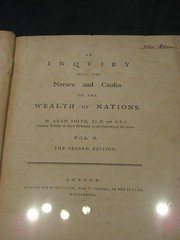When Adam Smith wrote The Wealth of Nations he was not writing about how economies and markets should work, he was writing about how they do work. Anyone who wants to know how they do work must read that book. Be prepared – it’s long and very detailed and you must be committed to doing a good deal of intellectual work if you are going to really understand it. The copy I have been reading is over 400 pages of small print and it is completely lacking in filler material.
I could not even pretend to give a summary of the book (as Wikipedia does) but I would like to point out one crucial detail that few people seem to realize and which shreds virtually every economic move our government makes. Money is a representation of value. Value is a representation of work and the only accurate determiner of price. Price controls and subsidies cannot alter the actual value of goods and services – all they can do is distort the representation of value and confuse the consumer by manipulating the data. Anytime there is a manipulative force in an economy the economy will respond, it will conform to the manipulation, but it still operates on the same universal laws.
I can easily understand how people today would be confused about the laws of economics because we have pundits, professionals, and even many economists who talk about the forces of economics as if they were under the control of men. The fact is that men can operate in accordance with those laws or they can try to manipulate them, but regardless of what we may observe the laws of economics will be obeyed and we will receive the consequences of our actions even if we are not sophisticated enough or have long enough lives to recognize those consequences. No matter how hard or how high we throw a ball – even into (or out of) orbit, it still must obey the laws of gravity.
The laws of economics are exactly as universal as the laws of physics. You can stand around all day arguing with a physicist about how gravity operates but at the end of the argument gravity will be unchanged. In your argument you can propose many great new ideas about how gravity should work, but gravity will be unchanged. If you have a misunderstanding of how gravity does work and operate based on that misunderstanding it will not preclude the possibility that you could design an airplane that flies, but designing an airplane that has not crashed yet does not prove that your understanding of gravity is correct and odds are pretty good that if your understanding is flawed the plane will have a flaw in its design that will either cause a crash or make the plane less functional than a plane designed by someone who understands the laws of physics.
What we have today in Washington – among both political parties – are a bunch of people most of whom grossly misunderstand the laws of economics and who believe that the laws of economics are no less subject to revision than the speed limit on an interstate highway. They mistake the reference to an invisible hand and believe that it refers to sleight of hand. The do not recognize the fact that there is nothing tricky or supernatural about the laws that Smith explained centuries ago. He did not make them up, he simply wrote them down after decades of study and observation – like any good scientist. In fact, the name of the book is “An Inquiry into the Nature and Causes of the Wealth of Nations.”


Thank you for observing that Smith was merely documenting actual phenomenon rather than opining about how economics ought to function. This fact is lost on most people that are even aware enough of Smith’s book to comment on it.
In the 2+ centuries since Smith published his foundational work, a number of additional economic truths have been discovered and defined, including how the supply-demand scale of money functions, a basic understanding of economic cycles, and the comprehension of marginal utility.
It should be no surprise that our politicians don’t understand (or at least appreciate) these factors, given that the public has little regard for them either. Indeed, it is as if our political system is at war with unchangeable economic facts. In our determination to prove them wrong, we will unavoidably end up proving them correct.
“In our determination to prove them wrong, we will ultimately end up proving them correct” to our detriment.
I agree .I like Danniel Hannan's phrase, "the productive part of the economy" which he called out Prime Minister Brown for ignoring in his famous speech in the British Parliment.' The Wealth of Nations' sounds like a very interesting read for these times. Maybe I will look for it.
I bought The Wealth of Nations a few years ago and immediately found out the truth of what you say about the mental effort required to read it. I had previously and have since read other economic books that whet my appetite to really dig in to the basis of so many other writings, BUT…have just not dedicated the time and effort necessary to do so. Your post is motivating. Maybe I’ll make a go of this over Christmas break.
By the way, you have had a long string of fabulous posts lately. I appreciate your analysis, discussion style, and humility, even when I occasionally disagree with you.
Like you I had read other books on economics before but this one really is out of the league of every other book I’ve read on the subject. Good luck in your renewed effort to finish it.
I’m glad that you have been enjoying my writing lately. Thanks for reading.